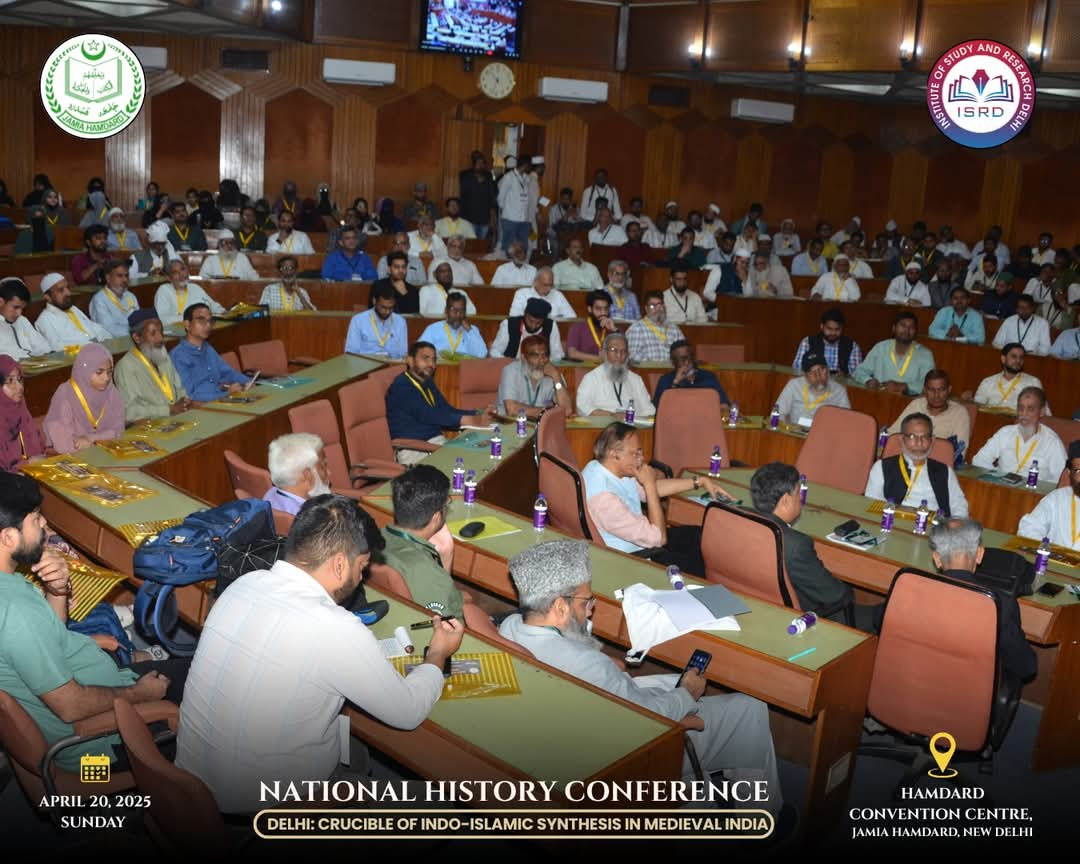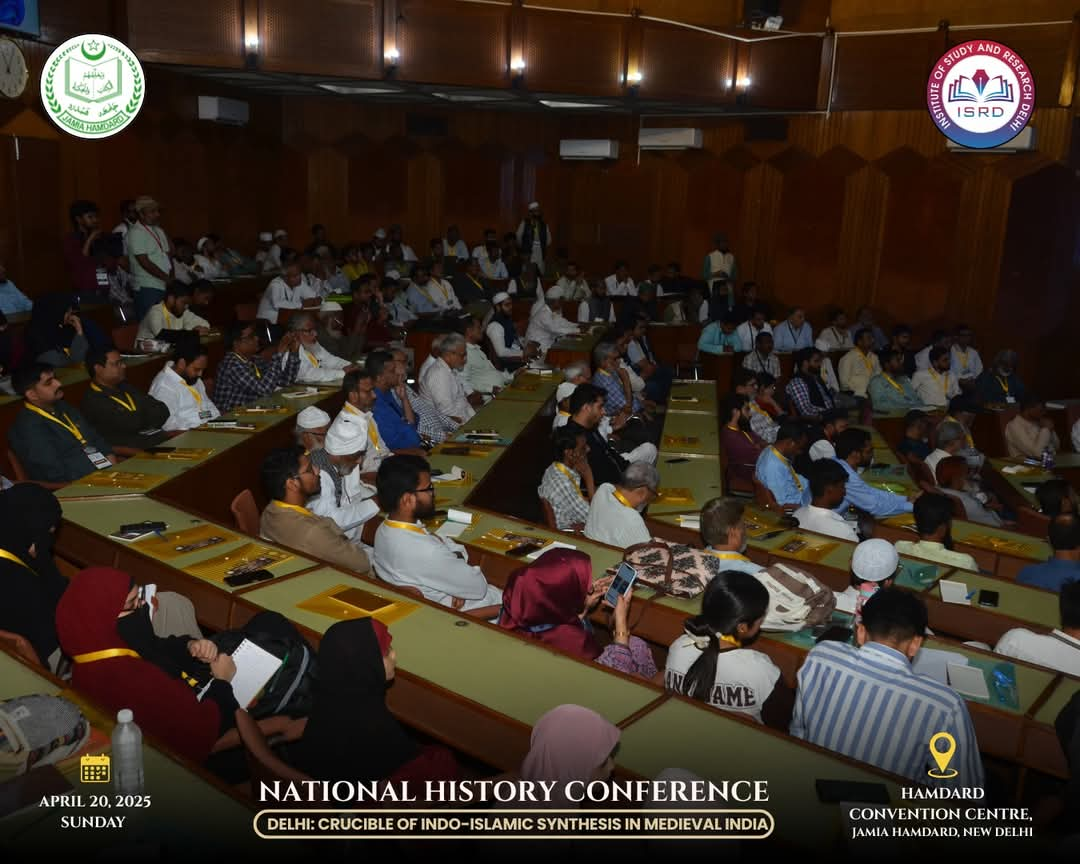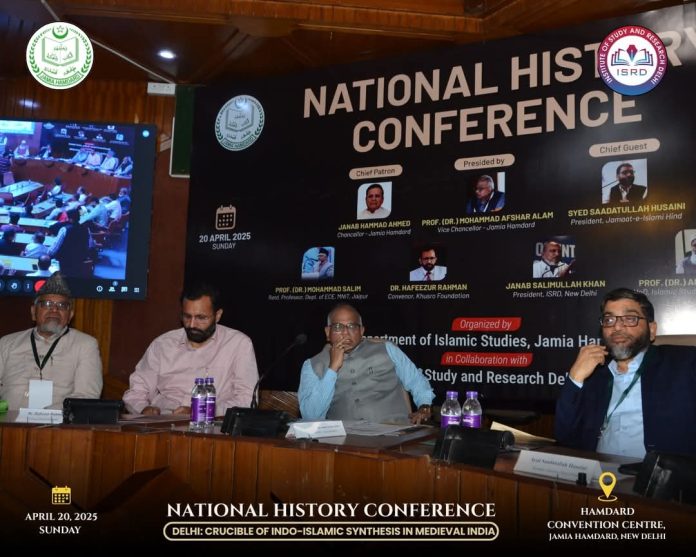New Delhi: A historic daylong National History Conference on “Delhi: Crucible of Indo-Islamic Synthesis in Medieval India,” was held at Hamdard Convention Centre, Jamia Hamdard here Sunday to highlight the remarkable contributions of Muslims in Medieval India in various fields and its importance. The event was jointly organised by the Department of Islamic Studies, Jamia Hamdard in partnership with the Institute of Study and Research Delhi (ISRD).
During the conference more than 50 research papers were presented by researchers and students from various institutions, including Jamia Millia Islamia (JMI), Aligarh Muslim University (AMU), Jawaharlal Nehru University (JNU), Maulana Azad National Urdu University (MANUU), and Jamia Hamdard.
The conference was attended by distinguished scholars, professors, researchers who examined the significant contributions of Muslims to the civilizational progress of India, with a particular focus on Delhi as the hub of Indo-Islamic cultural integration.
 The objective of the conference was to investigate the diverse influence of Islamic heritage on the formation of medieval Indian society, culture, governance, and artistic expression. A variety of research papers were presented, covering numerous sub-themes that corresponded with the main topic, including The Introduction of Islam in Northern India – Educational Institutions and the Production of Knowledge – Indo-Islamic Architectural Styles – Sufi Traditions and Sacred Sites – Language and Literary Developments – Music and the Performing Arts – Contributions to the Freedom Movement – Calligraphy and Decorative Arts – Culinary Heritage and Gastronomic Culture – Contributions of Women – Advances in Science and Technology – Mughal Garden Design – Innovations in Economic and Administrative Practices, etc.
The objective of the conference was to investigate the diverse influence of Islamic heritage on the formation of medieval Indian society, culture, governance, and artistic expression. A variety of research papers were presented, covering numerous sub-themes that corresponded with the main topic, including The Introduction of Islam in Northern India – Educational Institutions and the Production of Knowledge – Indo-Islamic Architectural Styles – Sufi Traditions and Sacred Sites – Language and Literary Developments – Music and the Performing Arts – Contributions to the Freedom Movement – Calligraphy and Decorative Arts – Culinary Heritage and Gastronomic Culture – Contributions of Women – Advances in Science and Technology – Mughal Garden Design – Innovations in Economic and Administrative Practices, etc.
Presiding over the conference, Dr. Afshar Alam, Vice Chancellor of Jamia Hamdard, provided an in-depth discussion on the architectural wonders of the Delhi Sultanate, highlighting its monuments, social reforms, advancements in science and technology, educational contributions, and its comprehensive initiatives aimed at fostering national development and unity.
 Earlier, in the inaugural session, Syed Sadatullah Husaini, President of Jamaat-e-Islami Hind, while presenting the keynote address, quoted the Quran to highlight the significance of studying and contemplating history to extract moral and social insights. He characterised history as the collective memory of a society and strongly countered modern misconceptions about Muslims, asserting, “Muslims are not outsiders, invaders, or colonizers – they are developers, builders, and inheritors of this land.” He pointed out that during the medieval era, the Delhi Sultanate served as a bridge connecting India to the wider Islamic realm of knowledge and scholarship.
Earlier, in the inaugural session, Syed Sadatullah Husaini, President of Jamaat-e-Islami Hind, while presenting the keynote address, quoted the Quran to highlight the significance of studying and contemplating history to extract moral and social insights. He characterised history as the collective memory of a society and strongly countered modern misconceptions about Muslims, asserting, “Muslims are not outsiders, invaders, or colonizers – they are developers, builders, and inheritors of this land.” He pointed out that during the medieval era, the Delhi Sultanate served as a bridge connecting India to the wider Islamic realm of knowledge and scholarship.
Providing historical instances, the JIH President highlighted that Sanskrit scholars and mathematicians from India were honoured in the court of Abbasid Caliphate, with their contributions being acknowledged and disseminated by Arab scholars, who credited the original sources rather than appropriating these advancements.
Additionally, he commended the architectural excellence of structures such as the Qutub Minar, which exemplify the legacy of Delhi Sultanate. Discussing broader contributions, he remarked that the Muslim period advanced ideals of human equality, justice, and social cohesion.
“The most significant contribution of Muslims,” he stated, “was the promotion of unity across diverse castes, religions, and communities – cultivating a sense of shared humanity, as eloquently expressed by Allama Iqbal’s notion of Wahdat-e-Khas (special unity of humankind).”
Dr. Hafeezur Rahman, Convenor of Khusro Foundation and a distinguished scholar in Urdu and Persian, highlighted that historiography frequently oscillates between narratives that support and those that oppose the establishment. He also highlighted that Islamic tradition has introduced the discipline of Asma-e-Rijal, which prioritises objectivity and authenticity in the recording of history.
ISRD President Salimullah Khan, emphasising the main theme of the conference, recalled an episode from the life of Prophet Muhammad ﷺ, underlining his ethical commitment to returning possessions to his opponents during the migration from Makkah to Madinah. He also recalled noted Urdu author Rashidul Khairi to underscore the contributions of women in Delhi during that period, portraying them as capable, intelligent, and socially conscious individuals in order to promote the concept of social welfare.
ISRD Secretary and convener of the conference Mohammad Asif Iqbal outlined the goals and sub-themes of the event, highlighting the cultural enrichment that arises from the interaction between civilizations.
The sessions were chaired by Prof. Obaidullah Fahad, Department of Islamic Studies, AMU; Prof. Pervez Nazir, Department of History, AMU; Dr. Faizan Ahmed, Assistant Director, National Archives of India; Dr. Mohiuddin Ghazi, former Dean, Al-Jamia Al-Islamia, Shantapuram, Kerala and Prof. Azizuddin Husain, former HoD History and Culture, JMI and former Director of Rampur Raza Library.
The valedictory session was presided over by Prof. Mohammad Salim Engineer, a retired professor from MNIT Jaipur. He encouraged emerging researchers to maintain the utmost standards of academic integrity, which resonate with Islamic principles. He emphasised the significance of objectivity, scholarly diligence, peer assessment, and critical analysis. “Avoid pursuing quantity – prioritise quality and there is no replacement for excellence and hard work.” He also asked the researchers to engage positively in national development and to actively participate in shaping history with integrity and knowledge.




